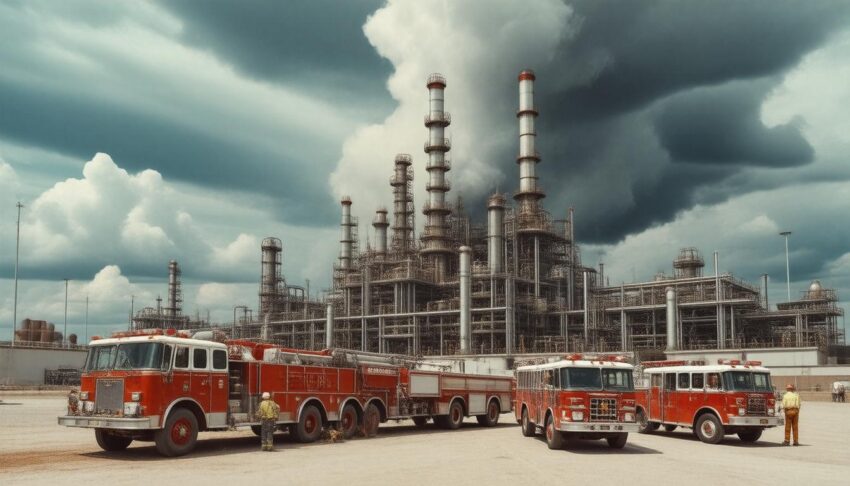Marathon Petroleum Corporation: Leading the Charge in Emergency Preparedness and Response
In today’s increasingly complex industrial landscape, the significance of emergency preparedness cannot be overstated.
Among the leaders in this field is Marathon Petroleum Corporation (MPC), a company steadfast in its commitment to safeguarding its operations and the communities in which it operates.
MPC recognizes that unforeseen events can disrupt not only business continuity but also pose risks to public safety and environmental integrity.
To mitigate these risks, the company has developed comprehensive emergency management plans tailored to the specific needs and risks of each operational location.
By ensuring that each site has a dedicated emergency response team that is well-versed in local challenges, MPC can respond proactively and effectively to a wide array of incidents.
Regular drills and exercises form a cornerstone of MPC’s readiness strategy, allowing response teams to practice their skills and improve their collaborative abilities.
This meticulous approach is complemented by rigorous oversight from federal regulatory agencies, including the U.S.
Environmental Protection Agency (EPA) and the U.S.
Coast Guard, which review and vet MPC’s emergency response plans to ensure compliance with relevant regulations.
In this article, we will explore the multifaceted emergency preparedness and response strategies employed by MPC, highlighting their dedication to innovation, training, and partnership with local, state, and federal agencies in times of crisis.
Key Takeaways
- Marathon Petroleum Corporation prioritizes emergency preparedness by customizing management plans for each operational site.
- The Emergency Preparedness Group coordinates training and drills to enhance the readiness of response teams for any incidents.
- Collaboration with federal, state, and local agencies strengthens MPC’s emergency response capabilities and ensures compliance with regulations.
Emergency Management Plans Tailored to Operational Locations
Emergency management is crucial for any large organization, particularly in the energy sector, where the stakes are exceedingly high.
Marathon Petroleum Corporation (MPC) recognizes the significance of emergency preparedness and has made it a cornerstone of its operational strategy.
Each of MPC’s operational locations has undergone a meticulous assessment to identify unique risks, leading to the development of comprehensive emergency management plans tailored specifically for those sites.
This commitment ensures that each location is equipped with a designated emergency response team and a customized response plan designed to effectively address the potential crises that may arise.
To maintain a high state of readiness, MPC regularly conducts drills and exercises, enabling their response teams to react swiftly and efficiently in real-life situations.
Moreover, the robustness of MPC’s emergency response plans is evidenced by their thorough vetting process by regulatory bodies such as the U.S.
Environmental Protection Agency (EPA) and the U.S.
Coast Guard, ensuring compliance with mandatory federal, state, and local regulations.
The oversight of these initiatives falls under the purview of the Emergency Preparedness Group (EPG) at MPC, whose objective is to enhance the organization’s readiness for a wide spectrum of emergencies.
The EPG also collaborates closely with the Corporate Emergency Response Team (CERT), a dedicated group comprising around 250 trained personnel capable of managing larger-scale incidents requiring significant resource allocation.
Training is integral to the effectiveness of these teams, and CERT members actively engage in collaborative exercises with federal, state, and local responders.
These partnerships are not just about preparedness; they serve to strengthen the overall emergency response ecosystem by building strong connections between various agencies.
A notable example of this collaborative effort occurred in 2024, during a significant exercise in Valdez, Alaska, which highlighted the commitment of multiple partners to emergency readiness.
In summary, Marathon Petroleum Corporation’s unwavering commitment to emergency preparedness is manifest in their tailored response plans, regular training exercises, and collaborative efforts with regulatory agencies.
Through this meticulous approach, MPC reinforces its capability to minimize the impact of emergencies on both people and the environment, ensuring that they remain prepared to tackle any unforeseen challenges that may arise.
Collaboration and Training for Effective Response
The ongoing commitment to collaboration and training at Marathon Petroleum Corporation (MPC) underscores the essence of effective emergency response in today’s dynamic operational environments.
MPC’s Emergency Preparedness Group (EPG) not only develops site-specific emergency response plans but also ensures these plans are integrated seamlessly with those of local, state, and federal agencies.
This expansive network of collaboration is essential, as it promotes a unified approach to emergency situations, allowing for faster and more efficient mobilization of resources.
In practice, this means that, during an actual emergency, communication lines are well-established, and response efforts can be coordinated across multiple jurisdictions, thereby enhancing the overall effectiveness of the emergency response.
Regular involvement in drills, such as the 2024 exercise in Valdez, serves as a catalyst for continual improvement, equipping teams not just with the necessary skills but also with invaluable experience in managing crises alongside various external agencies.
This proactive strategy is vital for fostering resilience and ensuring safety, both of which are paramount in the high-stakes energy sector.
Support Us: Check out our recommended products on Amazon.


